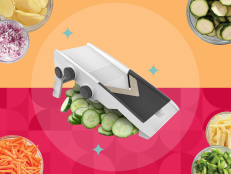How to Make Ramen Eggs (Ajitama)
All you need is six ingredients, including the eggs.

AuthorLinyt Photography/Getty Images
By Layla Khoury-Hanold for Food Network Kitchen
Layla Khoury-Hanold is a contributor at Food Network.
Ramen eggs, those soft-boiled, super savory eggs that accompany bowls of ramen, are one of the toppings that make restaurant ramen so delicious. But with a little planning and patience, you can easily make ramen eggs at home. To help us learn how to make these Japanese soft-boiled, marinated eggs, we consulted Pascale Yamashita, a recipe developer, food stylist, food photographer and avid food lover based in Japan.

AuthorLinyt Photography/Getty Images
What Are Ramen Eggs?
Ramen eggs are Japanese soft-boiled eggs marinated in a sweetened soy sauce mixture and served as a ramen topping. In Japan, ramen eggs are called ajitsuke tamago or ajitama. “Aji means taste, and tama means ball (or egg), so the literal translation is taste-ball,” Yamashita says.
Yamashita says that in Japan, the marinade ingredients vary depending on the ramen shop, but a soy-sauce-base is most common. The first ramen shop to serve ajitama was Kan Chin Tei in Ogikubo, Tokyo (now closed), where the chef served ramen with Taiwanese braised egg, a soy-sauce-marinated egg with herbs and spices. From there, the trend of serving savory, soft-boiled eggs as a ramen topping spread widely throughout Japan.

SherSor/Getty Images
Ingredients for Ramen Eggs
To make ramen eggs, you’ll need eggs, soy sauce (or tamari), mirin, sake (or cooking white wine), sugar and vinegar.
- 2 eggs
- 3 tablespoons plus 1 teaspoon soy sauce or tamari
- 3 tablespoons + 1 teaspoon mirin
- 3 tablespoons + 1 teaspoon sake
- 1 tablespoon sugar of your choice
- 1 tablespoon vinegar
How to Make Ramen Eggs, Step-by-Step
1. Boil the Eggs
Bring a large pot of water to a boil, then carefully lower eggs into the pot in a single layer and boil for 7 minutes.
2. Prepare the Ice Bath
While the eggs boil, fill a large bowl with ice and cold water. Once the eggs have finished boiling, immediately transfer them to the prepared ice bath to stop the cooking process and cool the eggs.
3. Peel the Eggs
Once the eggs are cool enough to handle, peel the eggs.
4. Make the Marinade
In a resealable plastic bag, combine soy sauce (or tamari), mirin, sake (or cooking white wine), sugar and vinegar.
5. Marinate the Eggs
Place eggs in the bag and ensure that the eggs are immersed in the liquid mixture. Seal the bag, removing any extra air, and allow eggs to marinate in the liquid for at least 24 hours, or up to 2 days. During the marinating process, periodically change the eggs’ position to ensure that they are evenly marinated.
6. Serve the Eggs
Cut eggs cleanly in half lengthwise and serve with ramen or enjoy as a snack.
Tips for Ramen Eggs
- To get jammy yolks: Setting up an ice bath is crucial to stopping the cooking process and ensuring that the eggs retain their signature soft-boiled, jammy yolk texture.
- To ensure the egg yolk stays in the center of the egg: Gently stir the water in circular motion during the first 3 to 4 minutes of boiling the eggs (be careful not to burn yourself). A centered egg yolk makes the egg more appealing when it’s sliced in half!
- To properly marinate the eggs: The salty-sweet marinade adds flavor but also helps to cure the egg, firming the whites and giving the jammy yolks their custardy consistency. Do not marinate the eggs longer than 2 days, or the marinade will cause the egg yolk to harden.
- To get a clean cut when slicing ramen eggs: Use a wet knife; wipe the knife clean and re-moisten between eggs. Alternatively, you can use an egg slicer designed to cut eggs in half or use a piece of thin sewing thread pulled taut.
- To save time: If you don’t have time to marinate the eggs, boil your egg in salted water to impart extra savory flavor.
Related Stories:































































